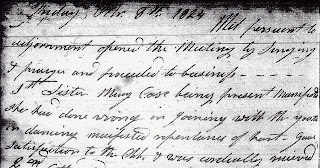The
Kimber Letters are writings exchanged between the Kimber sisters and their
mother, Keziah (Bennett) Kimber. The letters found their way to the sister’s
descendants. I treasure them and am grateful to the late Edna Raymond for
giving me transcriptions.
In
today’s letter, 3rd Great Grandaunt Sarah Bethia (Kimber) Mackney
writes to her sister Abigail in Orange County, New York. Sarah and her husband
William were living in Troy, Pennsylvania July 25, 1855. Of the nine Kimber
sisters, I affectionately dub Sarah as ‘the one that can dish it out’. Aunt
Sarah’s annoyed Aunt Abby hasn’t written and begins her letter with a zinger:
“I am going to drop a few lines to you
although I don’t know that is hardly my to duty to worry myself to do so for I
have never had the scratch of a pen from you since I have lived in
Pennsylvania”
She
continues to scold her in a humorous manner throughout her letter.
In
Sarah’s earlier writings, she describes health problems that trouble her. Just
the previous week, she tried electrical shock treatments to improve her health.
“I
have ben trying the power of electricity
I have taken three or four light shockes
the past week
it makes me feel rather nervous but the
Doc thinks that it will be a benefit”
Some
medical practitioners believed electricity could cure everything from constipation
to rheumatism. Perhaps future letters will reveal how Aunt Sarah fared from the
treatments.
The Detroit Free
Press
Sunday, March 24,
1889 Advertisement
Aunt
Sarah discussed Aunt Abby’s health with her doctor and planned to send her
medicine to try. Aunt Abby was experiencing ‘difficulties’.
A
little family news was exchanged about the nieces and nephews. Emily Decker,
Phebe Kimber and John Decker’s daughter, wrote to Aunt Jane (Kimber) Seeley
about James Clark’s marriage. James was the son of Charity Kimber and William
P. Clark. The Aunts speculated that Charity and William’s daughter might someday
marry Erastus Elston, the widower of their sister, Julia Ann Kimber.
Letter
12.
July
25th. 1855
Dear
Sister Abby
I
am going to drop a few lines to you although I
dont
know that it is hardly my duty to worry
myself
to do so for I have never had the scratch
of
a pen from you since I have lived in
Pennsylvania when I write to Mother I get
answered
directly and I love to write to her and
Mother
I shall write to you oftener if my health
gets
better it is very hard work for me to
write
now my health has somewhat improved
since
I wrote you and I think it is still
improving
although I have not been feeling quite
as
well for a few days past I have ben
trying
the
power of electricity I have taken
three or
four
light shockes the past week it makes
me€
feel
rather nervous but the Doc thinks that it
will
be a benefit to me and I think myself that
it
will Abby if you was here I would give
you
a
shock and arouse up your sensibilities
for I
have
got the machine here for perhaps it might
stir
you up to write occasionly the Doctor
thinks
that I am going to have my health pretty
good
yet I asked him the other day if he
thought
I should get smart enough to go th
Orange
County this fall and he said he thought I
would
I hope I can come for I want to come
home
so bad and see you all once more Abby I
am
going to send you some of my medicine and I
want
you to be sure and take it I will
send
two
kinds of pills enough to last 8 or 10 days
and
when you have taken them up write to me how
you
feel and just how the medicine affects you
if it afftects you at all be very particular to
write
how your health is and what your worst
difficulties
are this summer take them just as
I
have directed on the papers the ______ on
going
to bed and the beladonna twice a day
morning
and nooe the Doctor told me to send
you
these two remedies and let you try them
I
described
your case to him as well as I could
dont
eat any pepper allspice or nutmeg while
you
are taking them nor use any camphor every
thing
else you can eat as usual dont neglect
to
write when you have taken them up and you
will
hear from me again if the pills should
be
jammed
fine when they reach you as perhaps they
may
pick out 6 whole ones and jam them up and
then
you can give a pretty good guess how much
you
had ought to take if you should find the
pills
so large that you can not swollow them
with
ease Father will have to make a little
puncher
and punch them down but laying all
jokes
aside there is virtue in the little
critters
I assure you but I must close for I
am
so tired that I can not write decently
Jane
received
a letter from Emly Decker last night
after
she had done writing she wrote they
were
all
well and that James Clark was married on the
4th
to Harriet Wilson Emly said that
Erastus
said
he would come out west this fall if Phebe
Jane
will come with him and she said there
appeared
some signs of her becoming the mother
of
those dear little children I have no
remarks
to make only o dear you must all come
and
see us this fall if you can possibly no
more
at present write soon with my love now
and
ever good bye
to
Abby L. Kimber from Sarah L. Mackney
To read earlier Kimber Letters click on the
label 'Kimber Letters' at the bottom of this post.




